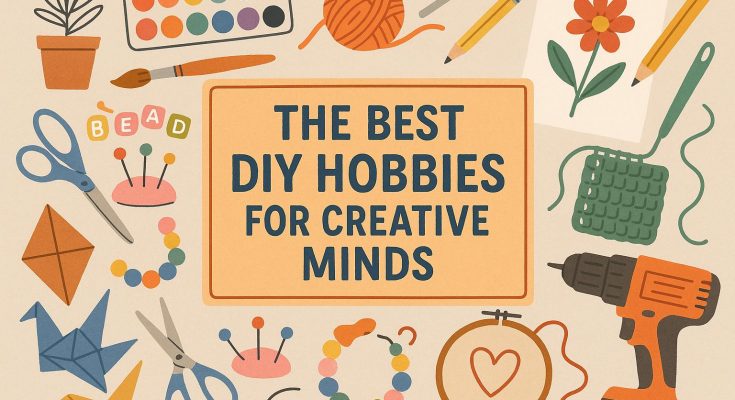Exploring DIY Hobbies for Creative Minds
Engaging in do-it-yourself (DIY) hobbies can be an excellent way to harness creativity while constructing useful or decorative objects. These activities provide an opportunity not just to create, but also to learn and experiment with various materials and techniques. Below are several DIY hobbies that stimulate creativity and are accessible to most enthusiasts.
Woodworking
Woodworking is a versatile craft where individuals shape wood into functional or artistic items. This hobby involves a range of techniques, from simple carving to complex joinery. Woodworking enthusiasts often find satisfaction in creating furniture, sculptures, or everyday items. It requires some basic tools, such as saws, chisels, and hammers. Resources like online tutorials and community workshops can help beginners get started.
Woodworking encourages attention to detail and precision as it involves measuring, cutting, and assembling various pieces of wood. The choice of wood is significant, with different types offering distinct aesthetics and workability. Softwoods like pine are great for beginners due to their ease of cutting and carving, while hardwoods such as oak and walnut offer durability and are often used for more refined projects.
Beyond creating individual pieces, woodworking can also involve restoring or upcycling old furniture. This aspect of the hobby not only breathes new life into forgotten items but also offers a sustainable approach to creativity. Workshops and courses aimed at furniture restoration can enable enthusiasts to acquire new skills, making woodworking a continuously evolving craft.
Painting and Drawing
Painting and drawing offer a wide scope for expression and innovation. Whether using watercolors, oils, acrylics, or pencils, individuals can explore different styles and develop their techniques. Beginners may benefit from online courses that cover basic skills and composition. Moreover, experimenting with various mediums and subjects can lead to a deeper understanding of artistic expression.
The world of painting and drawing is vast, with numerous styles and techniques to explore. Realism, abstract, impressionism, and surrealism are just a few examples of the styles that artists might delve into. Each style offers its own challenges and opportunities for exploration. Mastering the fundamentals of drawing, such as understanding light, shadow, and perspective, can greatly enhance one’s painting abilities.
Artists often find that sketching regularly improves their skills and enhances their observational abilities. This practice also allows for the exploration of new ideas, fostering creativity in other projects. Many find inspiration through nature, urban landscapes, or human figures, each providing unique challenges and rewards.
Sewing and Textiles
Sewing is not only practical but also a creative outlet for those interested in fashion and design. This hobby can involve making clothing, accessories, or home décor items. Understanding the basics of sewing machines and fabrics can open up many possibilities. For those looking to start, there are many free and paid resources online that teach sewing techniques and pattern making.
Aspiring sewers can experiment with different fabric types such as cotton, linen, silk, and wool, each with its unique properties and ideal applications. The choice of fabric plays a crucial role in the final appearance and functionality of any sewn item. From creating custom-fit garments to designing intricate quilts, sewing provides endless opportunities for personalization.
Understanding pattern making is fundamental for creating well-fitting garments, and many resources are available to teach this essential skill. Whether sewing by hand or with a machine, mastering stitching techniques like hemming, applique, and embroidery can add decorative or functional elements to projects.
DIY Electronics
For individuals interested in technology and innovation, DIY electronics can be exciting. Building gadgets or simple circuits allows for creativity and can sometimes solve everyday problems. Kits such as Raspberry Pi or Arduino offer endless project possibilities. Online platforms provide extensive communities and tutorials for DIY electronics enthusiasts to explore.
In DIY electronics, individuals might start with basic projects like building a simple LED circuit, progressing to more complex endeavors like creating custom smart home devices or robotics. Understanding the basics of electronics, including current, voltage, and resistance, is essential for more advanced projects.
Moreover, projects in this field can be highly customizable, allowing enthusiasts to design unique solutions tailored to their specific needs. Whether automating a coffee maker or developing a personal weather station, the spectrum of possibilities in DIY electronics is extensive, making it an engaging and ever-evolving hobby.
Gardening and Urban Farming
Gardening and urban farming can be fulfilling hobbies for those who enjoy working with plants and nature. Individuals can cultivate flowers, herbs, or vegetables in available spaces, transforming them into green havens. Gardening often involves learning about plant biology, soil types, and seasonal cycles. Beginners can find plenty of guides and gardening communities online to support their journey.
Urban farming takes gardening a step further by focusing on sustainability and self-sufficiency in smaller spaces. This might involve turning balconies or rooftops into productive food gardens or setting up hydroponic systems indoors. Techniques such as companion planting and crop rotation can enhance yield and maintain soil health.
The therapeutic benefits of gardening are well-documented, with many finding the process relaxing and rewarding. From designing a flower bed to constructing a vertical herb garden, these activities not only beautify environments but also contribute to ecological sustainability.
Pottery and Ceramics
Pottery allows creators to work with clay to form functional or decorative objects. This ancient art form requires a kiln for firing, along with basic tools for shaping and sculpting. Pottery can be both meditative and rewarding, allowing artisans to experiment with glaze colors and textures. Many local studios offer classes for beginners who want hands-on practice.
Creating pottery involves learning various techniques such as wheel throwing, hand-building, and slip casting. Each method presents different challenges and possibilities, enabling potters to craft unique and intricate pieces. The glazing process adds another layer of creativity, with endless combinations of colors and finishes for decorative or practical results.
Beyond individual pieces, pottery also involves creating sets like dinnerware or tea sets, enabling potters to explore themes of cohesion and functionality. Local studios often host community events or sell materials, supporting pottery enthusiasts in their creative journey.
Resources for Aspiring DIY Enthusiasts
Regardless of the hobby chosen, there are numerous resources and online platforms that offer tutorials and projects for all skill levels. Engaging with communities, both online and offline, can enhance learning and provide support as individuals develop their capabilities in their selected hobbies.
Online forums, social media groups, and blogs dedicated to specific DIY crafts are invaluable for inspiration and advice. Communities often celebrate accomplishments, offer constructive feedback, and provide an avenue to share experiences and expertise.
As people delve into their chosen hobbies, they might find these communities a source of collaboration and innovation, further enriching the DIY experience. This cross-pollination of ideas and techniques ensures that enthusiasts can continue to learn, experiment, and grow within their creative endeavors.





